Which Premier League winning team is the greatest of all time? What numbers do you need to hit to win the Premier League? And how does this season’s Liverpool team compare with the average Premier League champion?
We’ve crunched 27 years of data – and created a hypothetical table – to find out.
Our scoring system explained
Normally, a table is sorted from the team with the highest points down to the team with the lowest. We’ve done things a little differently:
- We’ve taken all 27 teams to have won the Premier League (plus this season’s champion elect, Liverpool) and analysed each of them based on 24 different performance categories. For example: goals scored, clean sheets, points-per-game.
- We’ve given each team a ranking from 1 to 28 in each category, with 1 being the best and 28 being the worst. For example, the Manchester City title-winning team of 2017/18 scored a record 106 goals in the league, hence it gets a number 1 ranking in the ‘goals scored’ category. By contrast, the Manchester United team of 1992/93 scored the lowest amount of goals of any Premier League champion, hence it gets a ranking of 28.
This system has thrown up some incredible results, with certain teams a lot lower down the table than you might expect. Let’s look at the final table…
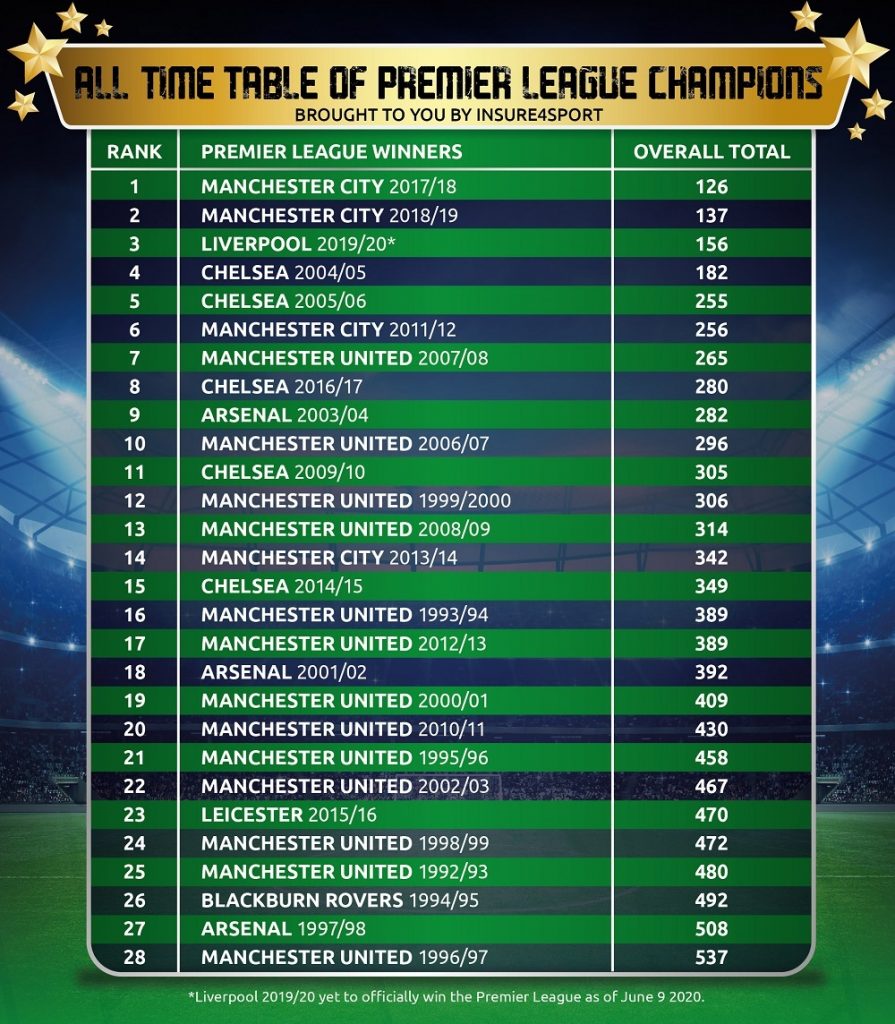
Which Premier League winning team is the greatest ever?
The Manchester City 2017/18 team is statistically the best ever to win the Premier League. This team achieved 100 points, scored 106 goals, won 32 games from 38 and finished 19 points clear of second place. It also won 18 consecutive matches, gained an amazing 2.63 points per game away from home and scored an eye-watering 3.21 goals per game at the Etihad. Yes, per game.
This team would have come out on top in 11 of the 24 categories we used to analyse every Premier League title winner, were it not for Liverpool’s stats so far this season. If this Reds team keeps posting similar numbers, it will become the third best team to win the Premier League.
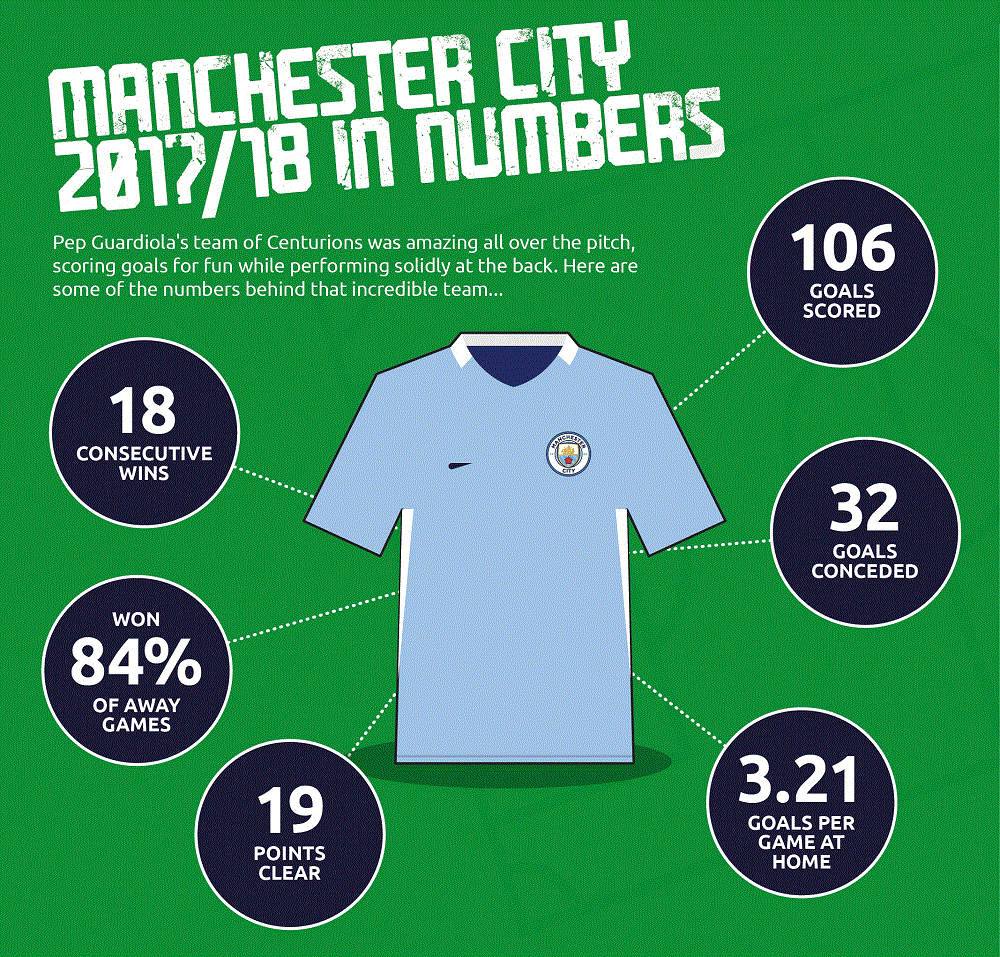
Whilst Manchester City’s position won’t shock many football fans, the position of the treble-winning Manchester United team surely will. This Red Devils team finishes fifth bottom, below Leicester’s title-winning team of 2016 based on our data. The Foxes got more points, won more games, conceded fewer goals and finished nine points further ahead of second place than the 1999 heroes.
And despite going an entire season unbeaten, the Arsenal ‘Invincibles’ team of 2003/04 is statistically only the ninth best side to win the Premier League. That’s not even high enough for a UEFA Cup spot! This team drew nearly a third of its matches and scored fewer goals than 19 other teams to win the Premier League. To put this into context, that’s 68% of the total number of winners.
Only two Manchester United teams make the top 10 – the 2006/07 and 2007/08 sides. The 2007/08 side conceded the fewest amount of goals at home out of every team to win the Premier League, letting in just seven goals in 19 games, and has the joint second-best record (along with Chelsea 2005/06) for goals conceded.
What are the highs and lows?
When you’re comparing champions over 27 years, you’re going to stumble across some fluctuating data. After all, no one team is the same.
Let’s look at some of the most – and least – impressive numbers which have been achieved by Premier League winning teams of yesteryear.
Points
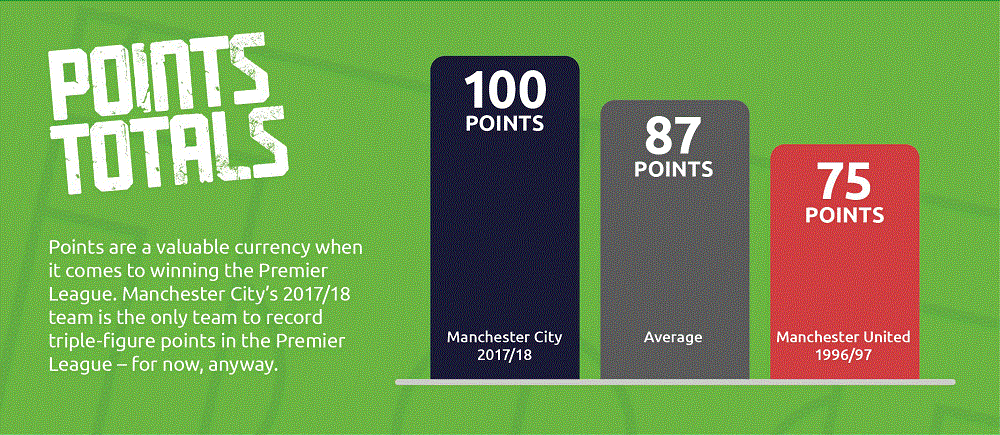
Manchester City’s record points total in 2017/18 is 13 points higher than the average achieved by a Premier League winning team. The Centurions reached 87 points with five games to spare, which puts their dominance into perspective. If the 2019/20 Liverpool team wins its next two matches, it will match the average points of a Premier League winning team with seven games to spare.
The lowest ever points tally of a title-winning side was recorded by Manchester United in 1996/97. This team won 21 games overall and fewer than two-thirds of its home matches.
Wins
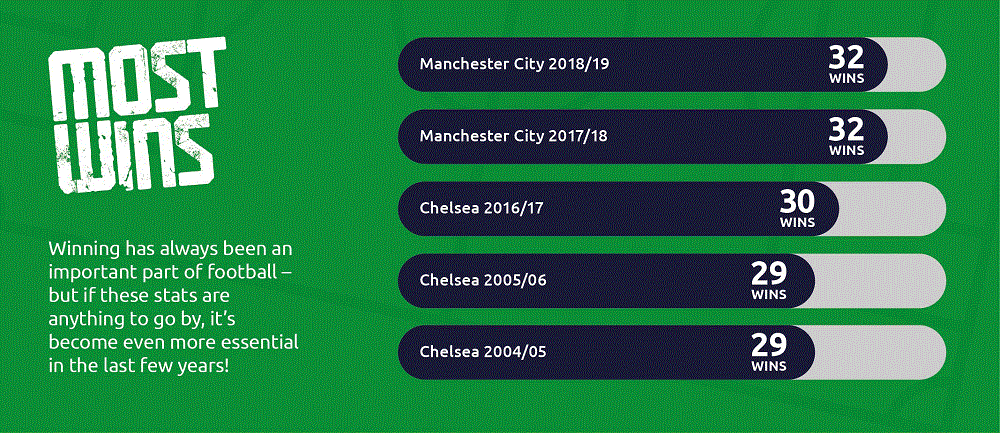
When it comes to victories, Pep Guardiola’s Manchester City side has proved the most ruthless, winning 32 games two seasons on the trot. Not only did the 2017/18 side win 18 straight games, the 2018/19 team won its last 14 consecutive matches. Talk about consistency.
The only other team to reach at least 30 wins was Antonio Conte’s Chelsea 2016/17 side. At the time, this team’s number of wins was a Premier League record, and this feat is made all the more remarkable by the fact it won only three of its first six games. Following a 3-0 defeat by Arsenal early in the season, it won 27 of its next 32 matches as Conte’s 3-4-3 formation reaped rewards.
In an amazing parallel to the aforementioned Manchester City teams, Jose Mourinho’s Chelsea sides of 2004/05 and 2005/06 also achieved the same number of wins two years in a row. The 2005/06 team won a then-record nine consecutive games at the start of the season, which culminated in another then-record of 17 wins from the first 19 games.
Defeats
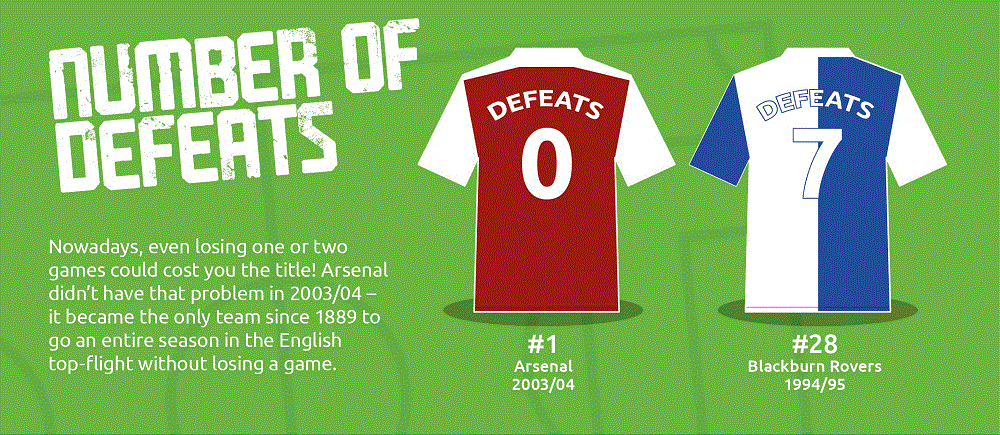
No surprises for guessing which team recorded the fewest defeats of any Premier League winning team. The ‘Invincibles’ didn’t lose a Premier League game between May 2003 and October 2004 and Arsenal’s 49-game unbeaten run is still a record in the English football league’s 132-year history.
By contrast, the Blackburn Rovers side of 1994/95 holds the record for the most defeats suffered by a Premier League winning team. Kenny Dalglish’s Rovers lost seven games that season, including three of its final five matches, almost doing a Devon Loch as Sir Alex Ferguson suggested it would need to in order not to win the league! (If you’re unfamiliar with the famous Devon Loch story, here you go.)
What does an average Premier League champion look like?

The average team to lift the Premier League trophy wins 26 of its games. The Arsenal 2001/02 side won exactly this many games, as did the ‘Invincibles’ and the 2014/15 Chelsea team.
87 is the average number of points gained by a Premier League winning team. However, this number may rise in the years to come. The last three teams to win the Premier League have achieved more than 90 points and this will become four if this season’s Liverpool team can get eight points or more from its last 9 games.
Despite ‘Squeaky Bum Time’ being a popular football term, our stats show that there’s rarely much of that when it comes to the title race. On average, a team which wins the Premier League finishes seven points clear of second place, meaning it wins the league with at least two games to spare.
Unsurprisingly, goals are a key currency for any Premier League winning side, with an average champion scoring 81 goals – more than two goals per game. It also keeps 17 clean sheets – but only six teams to win the Premier League have kept fewer than 15 clean sheets. So, the stats suggest that, if your team isn’t getting at least 15 clean sheets, it’s very unlikely to win the Premier League.
How does the current Liverpool team compare?*
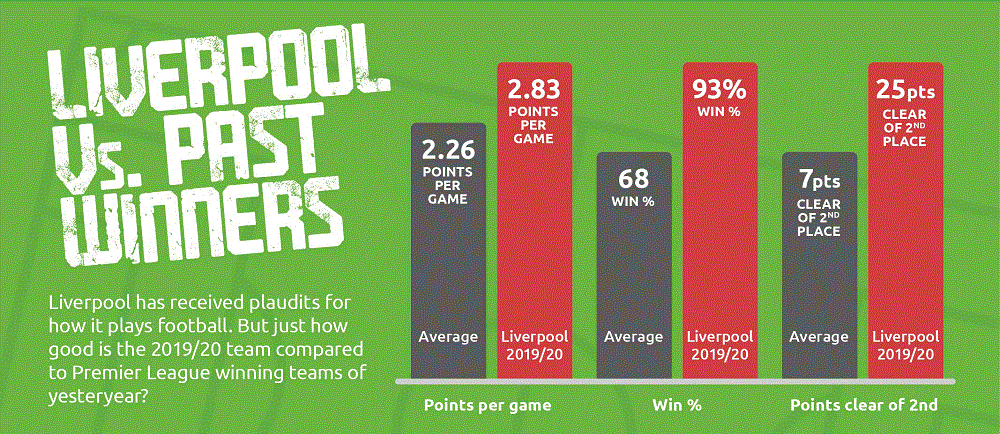
*Data correct as of June 9 2020
The Liverpool team of 2019/20 has gained 0.57 more points per game than the average Premier League champion so far. It has also won 25% more games and is 18 points further ahead of the 2nd placed team than an average league winning team finishes.
So why isn’t this Liverpool team on course to become statistically the best ever to win the Premier League?
Well, the main reason – surprisingly – is its defensive stats. Despite boasting arguably the world’s best central defender in Virgil Van Dijk, this side has conceded 0.72 goals per game so far – eight Premier League winning teams have conceded fewer goals per game. In fact, this is nearly double the amount of goals Chelsea let in during the 2004/05 season (0.39 goals conceded per game).
What’s more, the Liverpool 2019/20 team has kept clean sheets in 41% of its games, which is a lower percentage than 16 other Premier League winning teams. It’s by no means the worst defensive record of a Premier League winning side, but it’s not the best by a distance.
How has football changed over the years?

Back in the 90s, if a team got more than 80 points it stood a decent chance of winning the Premier League. Although the average is 83, this figure is skewed slightly by the fact that Manchester United achieved a then-record 92 points in the 1993/94 season.
- Three of the seven teams to win the Premier League in the 90s got fewer than 80 points (Manchester United 1996/97, Arsenal 1997/98 and Manchester United 1998-99).
Come the 00s, the bar was raised significantly, as more money crept into the game and the world’s best talent arrived on these shores. From 2000 to 2009, a team needed five more points on average across the season to win the Premier League.
- Five of the teams to win the Premier League in the 00s achieved more than 90 points – more than half of the champions during this decade.
Over the last 10 years, it’s been more of the same, as standards have increased ever so slightly. An average Premier League winning team between 2010 and 2019 picked up 89 points. Based on recent trends, it’s likely to become commonplace for teams to need more than 90 points in order to win the league.
- Half of the teams to win the Premier League since 2010 have gained at least 89 points, which is two more than the average Premier League winning team over the last 27 years.

Three decades ago, the average team to win the Premier League won 24, or 60%, of its games. This figure is staggering when you consider that, until 1995/96, there were 42 matches per Premier League season instead of 38 as there were more teams.
- Four of the seven teams to win the Premier League in the 90s drew 11 or more games, with Manchester United’s 1998/99 side drawing 13.
By the 00s, wins became a much more important commodity. During this period, a team needed three more wins across the season on average if it wanted to win the Premier League title.
- A team that won the Premier League in the 00s drew only seven of its games on average – a drop from 10 in the 90s.
From 2010 onwards, 28 wins has become the benchmark. This is not necessarily make or break if you look back over the whole period – Leicester City in 2015/16 and Manchester United 2010/11 managed to win the Premier League with only 23 victories. However, this is unlikely to happen again any time soon.
- Since 2016, the team that’s won the Premier League has racked up at least 30 wins. This trend is likely to continue this year, should Liverpool win three of its remaining nine matches.

This is the area of football which has changed most drastically over the last 30 years. From 1992 to 1999, a team that won the Premier League scored 75 goals. That’s fewer than two goals per game.
- The Manchester United team of 1992/93 and the Arsenal team of 1997/98 scored fewer than 70 goals en route to being crowned champions of England.
Over the course of the next decade, the average number of goals grew to 78, as the likes of Thierry Henry, Ruud van Nistelrooy, Cristiano Ronaldo and Didier Drogba took the Premier League by storm.
- The Manchester United team of 1999/00 scored 97 league goals. At the time, this broke the record for most goals scored by a Premier League champion by an incredible 17 goals.
Since 2010, we’ve seen a complete step change in English football when it comes to goals scored. Over the last 10 years, a team which has won the Premier League has scored a whopping 89 goals on average. This is undoubtedly down to the attacking philosophies of such coaches as Pep Guardiola, Carlo Ancelotti and Manuel Pellegrini.
- Three of the teams to win the Premier League since 2010 have scored more than 100 goals (Chelsea in 2009/10, Manchester City in 2013/14 and 2017/18).
- Five of the ten champions since 2010 have scored more than 90 goals.
- Leicester City only managed to score 68 goals when it won the league in 2016, winning by one goal on 14 occasions.
What do these stats tell us?
That today’s Premier League champions have very little margin for error. Settling for a draw doesn’t cut it anymore – a team often needs to go for broke or it risks missing out on the title. Look at Liverpool in 2018/19 as an example – although it won 30 games, it drew seven and finished second as a result.
The huge increase in the number of goals scored by an average Premier League winning team may come as a surprise to football fans. Especially when you consider that Alan Shearer and Andy Cole were scoring more than 30 goals a season.
Do these numbers hint at football becoming less about a team relying on a number nine to bang in the goals and more about attacking contributions from across the pitch? Do they highlight the changing role of a midfielder, in terms of goal output? Is football today less defensive and more hell for leather?
It’s also worth considering that football was more physical and defensive back in the 90s, making it more difficult for certain attacking players to flourish.
But one thing’s for certain – no matter which era or team you refer to, winning the Premier League has never been an easy feat. A few geniuses have just made it look easy along the way.




Leave a Reply